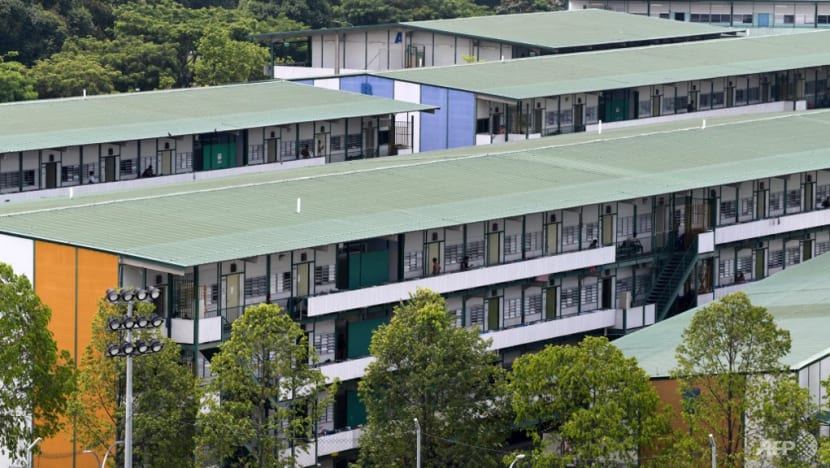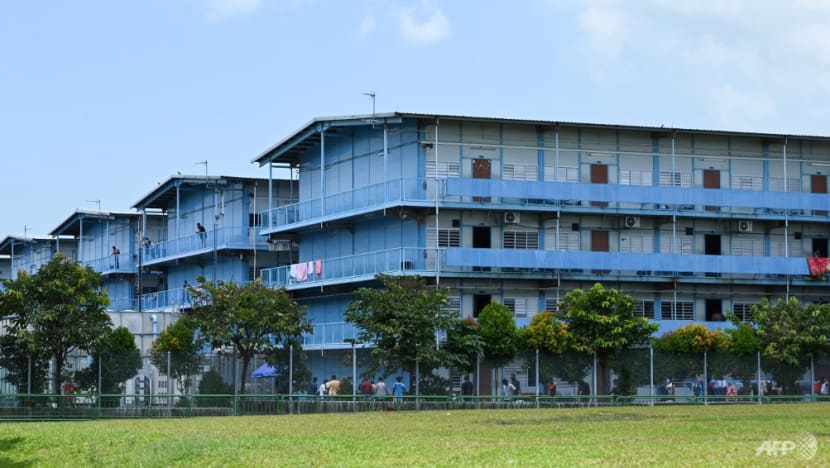Proof of accommodation 'a step in the right direction', continuous monitoring needed: Migrant worker groups

A file photo of a migrant worker dormitory in Singapore. (File photo: AFP/Roslan Rahman)
SINGAPORE: Migrant worker advocacy groups have welcomed the new requirement for employers in three sectors to show proof of acceptable accommodation before they are allowed to bring new non-Malaysian work permit holders into Singapore.
But there needs to be continuous inspections to ensure that workers stay at the declared accommodation and that conditions in the accommodation have not deteriorated, some of the groups said.
The requirement, which applies to the construction, marine shipyard and process sectors, will start on Sep 19, the Ministry of Manpower (MOM) said on Monday (Sep 11).
In response to CNA's queries, MOM said on Wednesday that dormitories are at full capacity amid the increased inflow of work permit holders into Singapore to meet sector needs. More migrant workers are being housed in non-dormitory accommodation, it added.
GOOD FIRST STEP, MORE CHECKS REQUIRED
Ms Dipa Swaminathan, founder of charity ItsRainingRaincoats, said that requiring employers to provide proof of accommodation is a good first step, but more needs to be done.
"I think it's definitely a step in the right direction. I'm very happy that MOM is thinking proactively about the living conditions of the migrant workers who are due to come to Singapore," she told CNA.
"My only concern here is that there must be ongoing monitoring, because it's very easy to show MOM some proof of accommodation for the workers, which looks very good, which looks very respectable and clean, and offers decent living conditions," she added.
"But who is to know that a month after the workers come here that (it) is not going to change?"
Ms Dipa said that the workers could be relocated or other workers could be moved into the accommodation. She added that while regulations are a "first start", there needs to be "continuous monitoring" of accommodation for migrant workers.
Transient Workers Count Too (TWC2) said that greater clarity is needed on how authorities ensure that workers reside at the declared accommodation.
"Greater enforcement is always welcome, and in fact, overdue. But we have yet to see details as to what the verification process will be, and how, for example, MOM will ensure the workers will in fact be staying at the location declared by the employers," said TWC2 president Debbie Fordyce.
She added that there "seems to be little preventing employers from moving workers to a cheaper accommodation once the worker has entered the country".
MOM told CNA that additional verification checks, including in-person inspections, may be conducted for non-dormitory accommodation such as private residential units. This is to ensure that they are not overcrowded and that the required documents are in order.
"MOM will continue to perform unannounced checks in dormitories and other housing types to ensure that workers are housed in safe and proper accommodation, and at the residential addresses declared by their employers," said the ministry.
The Migrant Workers' Centre (MWC) said that it is highly supportive of the new requirement.
"The government's commitment to ensuring that migrant workers have access to acceptable accommodation even before their arrival in Singapore is a significant step forward," said MWC executive director Michael Lim.
"This requirement not only guarantees documented evidence of adequate housing arrangements but also acts as a safeguard against the possibility of workers being left without suitable places to reside. By checking tenancy or rental agreements and contracts with accommodation providers, this measure establishes a benchmark for housing quality and legality."
Mr Lim added that the requirement of proof would promote transparency and "encourage employers to prioritise suitable housing for their workers".
"This ensures that the accommodation meets the necessary standards for safety, hygiene, and overall comfort," he said.
The new measure could potentially reduce overcrowding and mitigate subpar living conditions in some non-dormitory arrangements, he added.
CHALLENGES WITH FINDING ACCOMMODATION
Mr Kenneth Loo, the executive director and chief operating officer of Straits Construction, said that finding suitable accommodation for workers has been an ongoing challenge for some time.
"The accommodation condition in the market is still very tight, since last year. This is a challenge that we will be facing as we go on, it's not something new," said Mr Loo, who is a Singapore Contractors Association Limited council member.
He added: "Any responsible employer would definitely have to look for the accommodation (and) register the address before they bring their workers in.
"So now I guess it is upfront that you have to do it … it's now stated (in) black and white that you have to ... have that arrangement made before you bring them in."
MOM said it has worked with trade associations to inform employers of the new requirement.
The pre-entry housing checks are necessary to ensure that employers have secured acceptable housing for their workers before they arrive in Singapore, it added.
As of July this year, there are about 440,000 work permit holders in the construction, marine shipyard and process sectors. The vast majority of them live in dormitories.
ANONYMOUS WHISTLEBLOWING
Ms Dipa called for the introduction of "truly anonymous" whistleblower lines for migrant workers to report unacceptable living conditions.
"It's very difficult to get migrant workers to report anything adverse because they are fearful that they will suffer the repercussions of it and they'll lose their jobs," she said.
"No matter how much you show them that this is truly anonymous, they're very sceptical about it. So it's very hard to get true feedback from the workers. So really then the next best step is to do random checks and continuous checks."

Ms Dipa said that these checks are particularly important for accommodation such as factory-converted dormitories, as there are potential hazards and issues one may not find in purpose-built dorms.
She said that checks should also consider whether workers have enough recreation options and if they have access to public transport.
These inspections are key to supporting the mental well-being of workers.
"There's also a mental health element ... (what) if you're cooped up in some space that is not very suitable for human habitation?" she asked.
"What is the effect on their mental state if they're not well rested, and (the) next day they have to work? And mind you, their work is hard labour, it's not sitting at a computer and typing on a document right?
"They lose concentration for even one second, it could mean the difference between life and death."
MWC said accommodation policies should remain dynamic and responsive to evolving needs.
"We advocate for a continuous process of reviewing and refining these policies based on feedback from both employers and workers," Mr Lim said.
"This approach will ensure that the accommodation standards and regulations remain effective in protecting the welfare and environment of migrant workers."
















